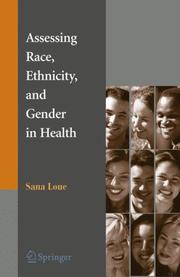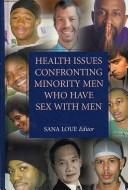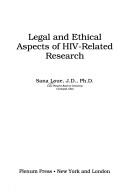| Listing 1 - 10 of 64 | << page >> |
Sort by
|

ISBN: 0387259864 0387259236 Year: 2006 Publisher: New York, New York : Springer,
Abstract | Keywords | Export | Availability | Bookmark
 Loading...
Loading...Choose an application
- Reference Manager
- EndNote
- RefWorks (Direct export to RefWorks)
Sexual risk behaviors have inspired profound ideas and effective teamwork. But as the early history of AIDS demonstrates, when sexual practice is part of the equation, the same bold thinkers may be stymied, or just silent. Safe sex and monogamy have been proposed as answers to a gamut of social problems, but there is frequently little consensus on what these terms mean. Sexual Partnering, Sexual Practices, and Health replaces myth and stereotype with meticulously documented findings on real people and their behaviors in their social, environmental, and individual contexts. Author Sana Loue examines the range of partnerships not only in the U.S. but also Europe and the developing world, focusing on both consenting relationships and exploitative sexual interactions: - Varieties of monogamy between consenting adults - Relationships involving multiple adult partners - Incest, pedophilia, and child marriage - Sex work, trafficking, and pornography - Fetishes and related behaviors All chapters cogently address the health issues that arise from these arrangements, concluding with implications for research, prevention, and intervention. Throughout, Loue argues for a common language across disciplines and challenges her readers—therapists, health care providers, and policymakers alike—to rethink their assumptions about clients, their health needs, and the communities they represent. "Dr. Loue's work is a truly significant scholarly contribution to a topic too often characterized by pseudo-science and ideological distortions. "Sexual Partnering, Sexual Practices, and Health" should prove an invaluable resource for researchers and community practitioners alike in helping understand dimensions of sexual practice, and designing more effective approaches to sexual health and violence prevention." -Earl Pike, Executive Director, AIDS Taskforce of Greater Cleveland.
Sex. --- Sex --- Sex customs. --- Health aspects. --- Customs, Sex --- Human beings --- Sexual behavior --- Sexual practices --- Manners and customs --- Moral conditions --- Gender (Sex) --- Human sexuality --- Sex (Gender) --- Sexuality --- Sexology --- Medicine. --- Public Health. --- Medicine/Public Health, general. --- Clinical sciences --- Medical profession --- Human biology --- Life sciences --- Medical sciences --- Pathology --- Physicians --- Health Workforce --- Public health. --- Community health --- Health services --- Hygiene, Public --- Hygiene, Social --- Public health services --- Public hygiene --- Social hygiene --- Health --- Human services --- Biosecurity --- Health literacy --- Medicine, Preventive --- National health services --- Sanitation

ISBN: 0387324623 0387324615 1441940804 Year: 2006 Publisher: New York, New York : Springer,
Abstract | Keywords | Export | Availability | Bookmark
 Loading...
Loading...Choose an application
- Reference Manager
- EndNote
- RefWorks (Direct export to RefWorks)
Assessing Race, Ethnicity, and Gender in Health Sana Loue, Case Western Reserve University, Cleveland Where there are patients, clients, or study participants, there are data. And when data involve personal variables of race, ethnicity, gender, and/or sexual orientation, questions of relevance and marginalization often arise. Assessing Race, Ethnicity, and Gender in Health brings needed clarity to the debate by identifying the ethical issues as well as the technical challenges inherent in measuring these elusive concepts. Sana Loue expands on her work begun in Gender, Ethnicity, and Health Research by paralleling the evolution of racial and sexual categories with the development of health research. Her review of the literature clearly explains when and why the use of classification systems may be both clinically and morally appropriate. In addition, Loue provides a salient guide to assessment tools currently used in measuring racial and sexual constructs, identity, and experience. Overview of categories in their sociopolitical context Self-definition vs. definition by others: methodological considerations Review of the overlapping roles of race, ethnicity, and sexual orientation in health, health care, and health care disparities Selected measures for assessing ethnicity, ethnic identification, and levels of acculturation Suggested dimensions for assessing sexual orientation Current diagnostic criteria for gender identity disorder Given the prevalence of ethnic- and gender-based data collection throughout the health and mental health fields, this book’s usefulness is not limited to the research community. Physicians, therapists, social workers, and sociologists will find this clear-minded volume an important source of instruments—and insights.
Health --- Ethnic groups. --- Gender identity. --- Public health. --- Sex customs. --- Research --- Community health --- Health services --- Hygiene, Public --- Hygiene, Social --- Public health services --- Public hygiene --- Sanitary affairs --- Social hygiene --- Human services --- Biosecurity --- Health literacy --- Medicine, Preventive --- National health services --- Sanitation --- Ethnic identities --- Ethnic nations (Ethnic groups) --- Groups, Ethnic --- Kindred groups (Ethnic groups) --- Nationalities (Ethnic groups) --- Peoples (Ethnic groups) --- Ethnology --- Personal health --- Wellness --- Medicine --- Physiology --- Diseases --- Holistic medicine --- Hygiene --- Well-being --- Customs, Sex --- Human beings --- Sexual behavior --- Sexual practices --- Manners and customs --- Moral conditions --- Sex --- Sex identity (Gender identity) --- Sexual identity (Gender identity) --- Identity (Psychology) --- Sex (Psychology) --- Queer theory --- Medicine. --- Public Health. --- Medicine/Public Health, general. --- Clinical sciences --- Medical profession --- Human biology --- Life sciences --- Medical sciences --- Pathology --- Physicians --- Health Workforce --- Gender dysphoria

ISBN: 1281148555 9786611148553 0387745394 0387745386 1441925635 Year: 2008 Publisher: New York, N.Y. : Springer,
Abstract | Keywords | Export | Availability | Bookmark
 Loading...
Loading...Choose an application
- Reference Manager
- EndNote
- RefWorks (Direct export to RefWorks)
Despite the growing body of research on minority men who have sex with men (MSM), coverage has tended to center around HIV/AIDS. Health Issues Confronting Minority Men Who Have Sex with Men presents a fuller picture by focusing on infrequently-studied health/mental health concerns, exploring day-to-day struggles under double-minority conditions, and spotlighting the innovative efforts of professionals and advocates in addressing these issues. Reflecting a spectrum of MSM (gay, bisexual, transgender, situational, "questioning") and ethnic communities (African-American, Latino, Asian, Pacific Islander, Native American), editor Sana Loue brings together a panel of collaborators including researchers, practitioners, activists, and first-person perspectives from minority MSM, to give readers an especially nuanced understanding of this diverse population. Among the issues covered in this important volume: Other-definition versus self-definition. Substance use/abuse. Sexual abuse and its aftermath. Body image disorders. HIV, AIDS, and HIV-related stigma. Homelessness. The combined perspectives will give professionals and advanced students in public health, social workers, and other interested readers a window beyond risks and behaviors, and onto community building, individual resilience, and survival as well.
Medicine. --- Public health. --- Health promotion. --- Health psychology. --- Sexual behavior. --- Sexual psychology. --- Medicine & Public Health. --- Health Promotion and Disease Prevention. --- Public Health. --- Sexual Behavior. --- Health Psychology. --- Clinical sciences --- Medical profession --- Human biology --- Life sciences --- Medical sciences --- Pathology --- Physicians --- Psychology, Sexual --- Sex --- Sexual behavior, Psychology of --- Sexual psychology --- Sensuality --- Health psychology --- Health psychology, Clinical --- Psychology, Clinical health --- Psychology, Health --- Salutogenesis --- Clinical psychology --- Medicine and psychology --- Health promotion programs --- Health promotion services --- Promotion of health --- Wellness programs --- Preventive health services --- Health education --- Community health --- Health services --- Hygiene, Public --- Hygiene, Social --- Public health services --- Public hygiene --- Sanitary affairs --- Social hygiene --- Health --- Human services --- Biosecurity --- Health literacy --- Medicine, Preventive --- National health services --- Sanitation --- Psychological aspects --- Gay men --- Health and hygiene. --- Medical care. --- Gays, Male --- Homosexuals, Male --- Male gays --- Urnings --- Gays --- Men --- Psychology, clinical. --- Clinical psychology. --- Psychiatry --- Psychology, Applied --- Psychological tests --- Health Workforce
Book
ISBN: 9783319141183 3319141171 9783319141176 331914118X Year: 2015 Publisher: Cham : Springer International Publishing : Imprint: Springer,
Abstract | Keywords | Export | Availability | Bookmark
 Loading...
Loading...Choose an application
- Reference Manager
- EndNote
- RefWorks (Direct export to RefWorks)
This book is a reference for mental health professionals who utilize sandplay therapy with their child and/or adult clients. The Brief consists of case studies that are drawn from composite situations occurring in actual practice. Although some of the ethical issues raised and addressed are specific to sandplay therapy, others are generalizable to other modalities of mental health practice. Each chapter draws on ethical principles of clinical practice and research. The Brief includes relevant portions of professional ethics codes governing mental health professionals from an array of English-speaking countries—Australia, Canada, the U.K., the U.S., and New Zealand—to maximize the relevance of the text to sandplay therapists globally, whether they are licensed psychologists, marriage and family therapists, counselors, or social workers.
Social Sciences. --- Social Work. --- Psychotherapy and Counseling. --- Psychotherapy. --- Social sciences. --- Social work. --- Applied psychology. --- Sciences sociales --- Psychothérapie --- Travail social --- Social Welfare & Social Work --- Social Sciences --- Social Welfare & Social Work - General --- Sandplay. --- Psychagogy --- Therapy (Psychotherapy) --- Counseling. --- Mental illness --- Clinical sociology --- Mental health counseling --- Treatment --- Play --- Sand tables --- Applied psychology --- Psychology, Practical --- Social psychotechnics --- Psychology --- Benevolent institutions --- Philanthropy --- Relief stations (for the poor) --- Social service agencies --- Social welfare --- Social work --- Human services --- Psychotherapy . --- Counselling --- Helping behavior --- Psychology, Applied --- Interviewing --- Personal coaching --- Social case work

ISBN: 9780306450556 0306450550 9780306468001 9786610042364 1280042362 030646800X Year: 1995 Publisher: New York (N.Y.): Plenum
Abstract | Keywords | Export | Availability | Bookmark
 Loading...
Loading...Choose an application
- Reference Manager
- EndNote
- RefWorks (Direct export to RefWorks)
The motivation and inspiration for this book come directly from expe- ences with clients during the years that I practiced HIV-related law at the Legal Aid Society of San Diego, Inc. The issues discussed in this work reflect issues that arose on a recurring basis with clients participating in HIV research studies, with investigators calling for guidance on the legal implications of particular aspects of their proposed studies, and with research institutions and health care facilities struggling to make sense of legal maneuvers aimed at obtaining the records of their HIV-infected patients. It is impossible to thank each of these persons individually for their provocative questions and their insights. The discussion of ethical and legal issues relating to the design of clinical trials reflects questions raised during discussions with Donald J. Slymen, Ph.D. Don was one of the first researchers, in my realm of experience, to pay close attention to ethical concerns, and I am greatly appreciative of his contribution to both my professional growth and the development of various scenarios discussed in this text. The portions of this text dealing with confidentiality are the result of many hours of thoughtful discussion and analysis with Penn Lerblance, J.D., now deceased and still missed. Penn and I often participated together as presenters of in-service training programs for health prof- sionals. Penn addressed discrimination, and I focused on confidentiality.
AIDS (Disease) --- Clinical trials --- Sida --- Etudes cliniques --- Research --- Moral and ethical aspects. --- Law and legislation. --- Recherche --- Aspect moral --- Droit --- -AIDS (Disease) --- -Clinical trials --- -Controlled clinical trials --- Patient trials of new treatments --- Randomized clinical trials --- Trials, Clinical --- Clinical medicine --- Human experimentation in medicine --- Acquired immune deficiency syndrome --- Acquired immunodeficiency syndrome --- Acquired immunological deficiency syndrome --- HIV infections --- Immunological deficiency syndromes --- Virus-induced immunosuppression --- -Law and legislation --- -Moral and ethical aspects --- Law and legislation --- Moral and ethical aspects --- -Research --- Controlled clinical trials --- Research&delete& --- Epidemiology. --- Medicine. --- Social sciences. --- Public Health. --- Health Promotion and Disease Prevention. --- Social Sciences, general. --- Public health. --- Health promotion. --- Behavioral sciences --- Human sciences --- Sciences, Social --- Social science --- Social studies --- Civilization --- Health promotion programs --- Health promotion services --- Promotion of health --- Wellness programs --- Preventive health services --- Health education --- Diseases --- Public health --- Community health --- Health services --- Hygiene, Public --- Hygiene, Social --- Public health services --- Public hygiene --- Social hygiene --- Health --- Human services --- Biosecurity --- Health literacy --- Medicine, Preventive --- National health services --- Sanitation --- Medical laws and legislation
Book
ISBN: 1461452821 1489996583 1283934000 146145283X Year: 2013 Publisher: New York : Springer,
Abstract | Keywords | Export | Availability | Bookmark
 Loading...
Loading...Choose an application
- Reference Manager
- EndNote
- RefWorks (Direct export to RefWorks)
The relationship is a circular one: people with mental illnesses are at increased risk for HIV infection, and individuals infected with HIV may experience a range of mental health problems, from anxiety and depression to conditions related to the disease or its treatment. Patients are not generally aware of this link, and clinicians may not have had the opportunity to have focused training on these intersecting issues. The Mental Health Practitioner’s Guide to HIV/AIDS offers providers valuable, wide-ranging information regarding these especially vulnerable client populations. Each of its lucidly-written entries offers a digest of the basic facts and explains the salience of the topic in mental health contexts, whether the reader’s interest is in understanding issues, boosting client coping and adherence, reducing care disparities, or improving quality of life. Also, each entry ends with a list of print references and web resources for further reading. An interdisciplinary array of HIV- and AIDS-related topics is included, such as: Populations at risk and risk behaviors Prevention, intervention, and coping strategies. Medical issues, including alternative healing, clinical trials, and aging with HIV. Care-related topics: access, standards, caregivers’ issues, and more. Social aspects, from stigmatization and partner violence to human rights and activism. Legal/ethical concepts, including informed consent, duty to warn, disclosure laws, and the Ryan White Act. The Mental Health Practitioner’s Guide to HIV/AIDS brings expert, up-to-date knowledge to mental health care providers, such as psychiatrists, social workers, psychologists, and marriage and family therapists.
HIV infections -- Psychological aspects. --- HIV-positive persons -- Psychology. --- Public health. --- Social work. --- HIV infections --- HIV-positive persons --- Psychiatry and Psychology --- Sexually Transmitted Diseases, Viral --- Immunologic Deficiency Syndromes --- Lentivirus Infections --- Slow Virus Diseases --- Virus Diseases --- Immune System Diseases --- Retroviridae Infections --- Sexually Transmitted Diseases --- Diseases --- RNA Virus Infections --- Acquired Immunodeficiency Syndrome --- HIV Infections --- Mental Disorders --- Medicine --- Social Welfare & Social Work --- Social Sciences --- Health & Biological Sciences --- Clinical Immunology --- Social Welfare & Social Work - General --- Psychological aspects --- Psychology --- AIDS (Disease) --- Mental health. --- Psychological aspects. --- Patients --- HIV (Viruses) infections --- HTLV-III infections --- HTLV-III-LAV infections --- Human T-lymphotropic virus III infections --- HIV-infected persons --- HIV patients --- HIV-sero-positive persons --- HIV-seropositive persons --- People living with HIV/AIDS --- Positive persons, HIV --- -Sero-positive persons, HIV --- -Seropositive persons, HIV --- -Mental health. --- Social sciences. --- Social policy. --- Clinical psychology. --- Social Sciences. --- Social Work. --- Clinical Psychology. --- Public Health. --- Social Policy. --- Lentivirus infections --- Sexually transmitted diseases --- -Patients --- Psychology, clinical. --- National planning --- State planning --- Economic policy --- Family policy --- Social history --- Benevolent institutions --- Philanthropy --- Relief stations (for the poor) --- Social service agencies --- Social welfare --- Social work --- Human services --- Community health --- Health services --- Hygiene, Public --- Hygiene, Social --- Public health services --- Public hygiene --- Social hygiene --- Health --- Biosecurity --- Health literacy --- Medicine, Preventive --- National health services --- Sanitation --- Psychiatry --- Psychology, Applied --- Psychological tests --- Sexually transmitted diseases. --- Diseases. --- HIV infections. --- Mental illness. --- Immunological deficiency syndromes. --- Lentivirus infections. --- Slow virus diseases. --- Virus diseases. --- Immunologic diseases. --- Retrovirus infections. --- Psychology. --- Immune diseases --- Immune disorders --- Immune system --- Immunologic disorders --- Immunological diseases --- Viral diseases --- Viral infections --- Virus infections --- Communicable diseases --- Medical virology --- Pathogenic viruses --- Slow infections, Viral --- Slow viral infections --- Virus diseases, Slow --- Virus diseases --- Prion diseases --- Retrovirus infections --- Immune deficiency syndromes --- Immunodeficiency syndromes --- Immunologic deficiency syndromes --- Immunodeficiency --- Immunologic diseases --- Syndromes --- Madness --- Mental diseases --- Mental disorders --- Disabilities --- Psychology, Pathological --- Mental health --- Human beings --- Illness --- Illnesses --- Morbidity --- Sickness --- Sicknesses --- Epidemiology --- Pathology --- Sick --- Sexual diseases --- Sexually transmissible infections --- Sexually transmitted infections --- STDs (Diseases) --- STIs (Sexually transmitted infections) --- VD (Disease) --- Venereal diseases --- Sexual health --- AIDS patients --- People with AIDS --- Persons with AIDS --- PWAs
Book
ISBN: 1489982760 0387756566 9786612827761 1282827766 0387756574 Year: 2009 Publisher: New York : Springer,
Abstract | Keywords | Export | Availability | Bookmark
 Loading...
Loading...Choose an application
- Reference Manager
- EndNote
- RefWorks (Direct export to RefWorks)
Sexualities and Identities of Minority Women Edited by Sana Loue, Case Western Reserve University, Cleveland, OH This singular volume addresses the issues confronting minority women of diverse sexual orientations (lesbian, bisexual, transgender, transsexual, and questioning)—challenges that often diverge substantially from those of other women of color, and from those affecting minority men who have sex with men. Contributions from scholars, public health professionals, and members of the community reveal a wide range of developmental, relational, political, and legal concerns that have been given scant attention in either the minority or the sexual minority literature. From these varied perspectives, experiences of stigma and unity, isolation and hope, are discussed with rare sensitivity and insight. Key areas of coverage include: Development of sexual identity and minority identity: similarities and differences. Minority sexual status among minorities/minority status among sexual minorities. Constructing the family: social and legal aspects. Navigating the health care system: from access to care to disclosure to providers. Safety and violence in the workplace and community. Religion and spirituality: exclusion and support. Sexualities and Identities of Minority Women is not only a source of practice-enhancing information, but also an opportunity to hear the voices of its subject, making the book especially relevant to health care providers, and to professionals and researchers in psychology, sexuality, public health, health policy, social work, and counseling. It is suitable as a graduate-level text in any of these fields.
Identity (Psychology). --- Sex -- Social aspects. --- Sex (Psychology). --- Sexual minorities. --- Sexual minorities --- Sex --- Sex (Psychology) --- Identity (Psychology) --- Gender Identity --- Women --- Minority Groups --- Social Isolation --- Sexuality --- Sexual Behavior --- Persons --- Identification (Psychology) --- Social Behavior --- Psychosexual Development --- Sociology --- Reproductive Physiological Phenomena --- Behavior --- Named Groups --- Social Sciences --- Personality Development --- Psychoanalytic Theory --- Reproductive and Urinary Physiological Phenomena --- Defense Mechanisms --- Personality --- Behavior and Behavior Mechanisms --- Anthropology, Education, Sociology and Social Phenomena --- Psychological Theory --- Phenomena and Processes --- Psychiatry and Psychology --- Psychological Phenomena and Processes --- Gender Studies & Sexuality --- Public Health - General --- Public Health --- Gender & Ethnic Studies --- Health & Biological Sciences --- Social aspects --- Social aspects. --- Personal identity --- Gender minorities --- GLBT people --- GLBTQ people --- LBG people --- LGBT people --- Lesbigay people --- LGBTQ people --- Non-heterosexual people --- Non-heterosexuals --- Sexual dissidents --- Medicine. --- Public health. --- Sociology. --- Psychotherapy. --- Counseling. --- Sexual behavior. --- Sexual psychology. --- Gender expression. --- Gender identity. --- Medicine & Public Health. --- Public Health. --- Sexual Behavior. --- Gender Studies. --- Psychotherapy and Counseling. --- Sociology, general. --- Sex identity (Gender identity) --- Sexual identity (Gender identity) --- Queer theory --- Expression, Gender --- Sex role --- Psychology, Sexual --- Sexual behavior, Psychology of --- Sexual psychology --- Sensuality --- Counselling --- Helping behavior --- Psychology, Applied --- Clinical sociology --- Interviewing --- Personal coaching --- Social case work --- Psychagogy --- Therapy (Psychotherapy) --- Mental illness --- Mental health counseling --- Social theory --- Social sciences --- Community health --- Health services --- Hygiene, Public --- Hygiene, Social --- Public health services --- Public hygiene --- Sanitary affairs --- Social hygiene --- Health --- Human services --- Biosecurity --- Health literacy --- Medicine, Preventive --- National health services --- Sanitation --- Clinical sciences --- Medical profession --- Human biology --- Life sciences --- Medical sciences --- Pathology --- Physicians --- Psychological aspects --- Treatment --- Self --- Ego (Psychology) --- Individuality --- Minorities --- Developmental psychology. --- Applied psychology. --- Applied psychology --- Psychology, Practical --- Social psychotechnics --- Psychology --- Development (Psychology) --- Developmental psychobiology --- Life cycle, Human
Book
ISBN: 1489997806 1461467373 1461467381 Year: 2013 Publisher: New York : Springer Science,
Abstract | Keywords | Export | Availability | Bookmark
 Loading...
Loading...Choose an application
- Reference Manager
- EndNote
- RefWorks (Direct export to RefWorks)
As globalization causes profound changes in business, industry, and trade,it can also have significant effects on populations, environments, and individuals.These effects may be harmful, resulting in injury or illness, prompting the critical question: How best to correct wrongs caused to individuals, communities, and/or the environment of onecountry by the actions of individuals or corporations of another? Possible answers lie in an emerging discipline. Forensic Epidemiology in the Global Context opens meaningful windows onto the processes of forensic epidemiology, the roles of the epidemiologist in civil disputes, and the potential contribution of the field to legal and justice efforts worldwide. Case examples from the U.K., Nigeria, Ecuador, Romania, and Australia illustrate commonly used methodologies and the challenges involved in their use in U.S. and international courts of law. A chapter on expert testimony takes readers through qualification and admissibility issues, report requirements, and working with attorneys. Included in the coverage: Forensic epidemiology in the international legal arena. The epidemiologist as an expert in litigation. Epidemiological evidence in tort law: dispatches from the U.K. Liability for occupational exposure: the role of epidemiology. Forensic epidemiology and environmental justice. Forensic epidemiology, pathology, ethnics, and human rights. By emphasizing both the scientific and legal components of the equation, Forensic Epidemiology in the Global Context gives researchers and graduate students in epidemiology a unique and timely guide to the present and future of an increasingly salient field. .
Epidemiology. --- Expert Testimony. --- Forensic epidemiology. --- Forensic medicine. --- Forensic epidemiology --- Public Health --- Health & Biological Sciences --- Epidemiology & Epidemics --- Medical jurisprudence. --- Forensic medicine --- Injuries (Law) --- Jurisprudence, Medical --- Legal medicine --- Legal epidemiology --- Medicine. --- Private international law. --- Conflict of laws. --- International law. --- Comparative law. --- Psychology. --- Medicine & Public Health. --- Law and Psychology. --- Private International Law, International & Foreign Law, Comparative Law. --- Epidemiology --- Medical jurisprudence --- Forensic sciences --- Medicine --- Medical laws and legislation --- Law --- Private International Law, International & Foreign Law, Comparative Law . --- Psychological aspects. --- Diseases --- Public health --- Juridical psychology --- Juristic psychology --- Legal psychology --- Psychology, Juridical --- Psychology, Juristic --- Psychology, Legal --- Psychology, Applied --- Therapeutic jurisprudence --- Psychology --- Choice of law --- Conflict of laws --- Intermunicipal law --- International law, Private --- International private law --- Private international law --- Legal polycentricity --- Behavioral sciences --- Mental philosophy --- Mind --- Science, Mental --- Human biology --- Philosophy --- Soul --- Mental health --- Civil law

ISBN: 1280043032 9786610043033 0306468395 0306464489 9780306464485 9780306468391 Year: 2000 Publisher: New York Kluwer
Abstract | Keywords | Export | Availability | Bookmark
 Loading...
Loading...Choose an application
- Reference Manager
- EndNote
- RefWorks (Direct export to RefWorks)
Providing a history of human experimentation, this volume reviews various theories of ethics from which the principles and rules that govern this research are derived. Including case examples and exercises for discussion, it is of interest to students and researchers who design and disseminated findings using human subjects in their research. This textbook provides a brief history of human experimentation and reviews various theories of ethics from which the principles and rules that govern this research are derived. All relevant international documents and national regulations, policies and memoranda are referred to extensively to assist in addressing issues that regularly arise during the course of research involving human subjects. It includes case examples and exercises and is of interest to students and experienced researchers.
Epidemiology. --- Ethics. --- Medical ethics. --- Medicine. --- Public health laws. --- Research - Moral and ethical aspects. --- Medical ethics --- Human experimentation in medicine --- Research --- Ethical Analysis --- Ethics, Research --- National Socialism --- Social Control, Formal --- Human Experimentation --- Vulnerable Populations --- Ethics --- History --- Scientific Misconduct --- Ethics Committees, Research --- Informed Consent --- Research Design --- Ethics, Medical --- Confidentiality --- Conflict of Interest --- Jurisprudence --- Patient Rights --- Ethics Committees --- Ethics, Clinical --- Morals --- Humanities --- Professional Misconduct --- Health Care Quality, Access, and Evaluation --- Political Systems --- Science --- Methods --- Persons --- Biomedical Research --- Philosophy --- Investigative Techniques --- Sociology --- Health Care Economics and Organizations --- Forensic Psychiatry --- Named Groups --- Natural Science Disciplines --- Health Care --- Analytical, Diagnostic and Therapeutic Techniques and Equipment --- Social Sciences --- Ethics, Professional --- Human Rights --- Professional Staff Committees --- Psychology, Social --- Psychiatry --- Professional Practice --- Anthropology, Education, Sociology and Social Phenomena --- Behavior and Behavior Mechanisms --- Disciplines and Occupations --- Behavioral Sciences --- Quality Assurance, Health Care --- Organization and Administration --- Psychiatry and Psychology --- Behavioral Disciplines and Activities --- Health Services Administration --- Medical Ethics & Philosophy --- Medicine --- Health & Biological Sciences --- Moral and ethical aspects --- Moral and ethical aspects. --- Human Experimentation. --- Expérimentation humaine en médecine --- -Medical ethics --- Experimentation on humans, Medical --- Medical experimentation on humans --- Public health. --- Medical laws and legislation. --- Medicine & Public Health. --- Public Health. --- Theory of Medicine/Bioethics. --- Medical Law. --- Professional ethics. Deontology --- Ethics, Medical. --- legislation & jurisprudence. --- #GBIB:CBMER --- Biomedical ethics --- Clinical ethics --- Health care ethics --- Medical care --- Bioethics --- Professional ethics --- Nursing ethics --- Social medicine --- Research ethics --- Law, Medical --- Medical personnel --- Medical registration and examination --- Physicians --- Surgeons --- Medical policy --- Medical jurisprudence --- Deontology --- Ethics, Primitive --- Ethology --- Moral philosophy --- Morality --- Philosophy, Moral --- Science, Moral --- Values --- Diseases --- Public health --- Community health --- Health services --- Hygiene, Public --- Hygiene, Social --- Public health services --- Public hygiene --- Social hygiene --- Health --- Human services --- Biosecurity --- Health literacy --- Medicine, Preventive --- National health services --- Sanitation --- Legal status, laws, etc. --- Law and legislation
Book
ISBN: 3319135384 3319135392 Year: 2016 Publisher: Cham : Springer International Publishing : Imprint: Springer,
Abstract | Keywords | Export | Availability | Bookmark
 Loading...
Loading...Choose an application
- Reference Manager
- EndNote
- RefWorks (Direct export to RefWorks)
This book serves as a reference for social workers, psychologists, counselors, and other mental health professionals who utilize therapeutic farm therapy with their children or adult clients. The Brief is also valuable for policy makers at state mental health agencies and legislators, who must decide how to best utilize limited funding for mental health care. Chapters focus on the development of the therapeutic farm approach, various models of therapeutic farms in the U.S. and Europe, and case studies of specific therapeutic farms.
Social sciences. --- Social work. --- Psychotherapy. --- Counseling. --- Social Sciences. --- Social Work. --- Psychotherapy and Counseling. --- Therapeutic communities. --- Psychoses --- Mental illness --- Farms. --- Treatment. --- Farmsteads --- Communities, Therapeutic --- Community, Therapeutic --- Therapeutic community --- Agriculture --- Land use, Rural --- Real property --- Psychiatry --- Alternatives to psychiatric hospitalization --- Mental health facilities --- Milieu therapy --- Applied psychology. --- Applied psychology --- Psychagogy --- Psychology, Practical --- Social psychotechnics --- Psychology --- Benevolent institutions --- Philanthropy --- Relief stations (for the poor) --- Social service agencies --- Social welfare --- Social work --- Human services --- Counselling --- Helping behavior --- Psychology, Applied --- Clinical sociology --- Interviewing --- Personal coaching --- Social case work --- Therapy (Psychotherapy) --- Mental health counseling --- Treatment
| Listing 1 - 10 of 64 | << page >> |
Sort by
|

 Search
Search Feedback
Feedback About UniCat
About UniCat  Help
Help News
News